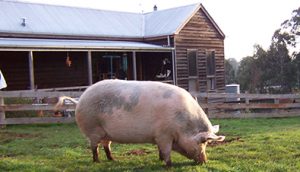Read the latest information on
Foot-and-mouth disease
 Given the rapidly changing situation globally with African swine fever (ASF), Animal Health Australia are reminding all landholders who keep pigs to be extremely discerning with what they’re fed, in order to prevent the introduction of new diseases to Australia.
Given the rapidly changing situation globally with African swine fever (ASF), Animal Health Australia are reminding all landholders who keep pigs to be extremely discerning with what they’re fed, in order to prevent the introduction of new diseases to Australia.
“One of the biggest risks of introducing diseases to piggeries is in their feed,” according to Dr Simon Humphrys, AHA’s Executive Manager of Biosecurity and Product Integrity.
“ASF is caused by an incredibly resilient virus which can survive in pork products and isn’t fazed by being cooked or frozen. For this reason, the easiest way to ensure pigs don’t ingest the virus is to ensure there’s simply no meat, nor anything that has been in contact with meat, in their feed.”
Every state and territory in Australia has laws against the feeding of swill – that is meat products and anything that has been in contact with meat products – to pigs. Doing so carries heavy penalties.
“We understand that many pig owners choose to cut down on food waste by feeding scraps to their pigs,” said Dr Humphrys.
“This is a great idea, but only if there is absolutely no chance that this food contains meat.”
As the ASF outbreak has moved into Western Europe and parts of East Asia, the Australian Government has continued to modify import requirements from infected countries.
“For obvious reasons we don’t import products from countries known to be affected by ASF, foot-and-mouth disease (FMD) and other major livestock diseases,” said Dr Humphrys.
“The products we do import must meet strict requirements, even when coming from a ‘free’ country.”
However, in our increasingly connected world, imports are not the only way contaminated products might enter Australia.
Testing of seized products coming into Australia on flights and in the mail recently revealed that around one in ten pork products seized by biosecurity officials were contaminated with ASF.
One percent of samples tested were also positive for FMD.
“These results indicate that our biosecurity system is doing its job,” said Dr Humphrys.
“While testing is not always carried out, products seized at the border and in mail centres are always destroyed before they can pose a risk to Australia.”
These detections in seized products do not change Australia’s ASF- and FMD-free status. Australian meat continues to enjoy its reputation for being clean and safe.
“That being said, why would you ever risk the health of your pigs by feeding them swill?”
Find out more about biosecurity for pigs via the Farm Biosecurity website.